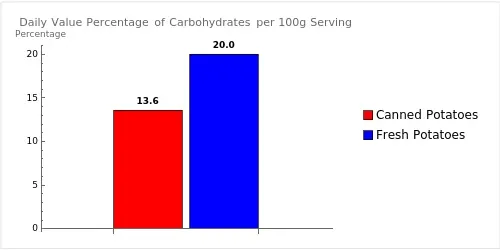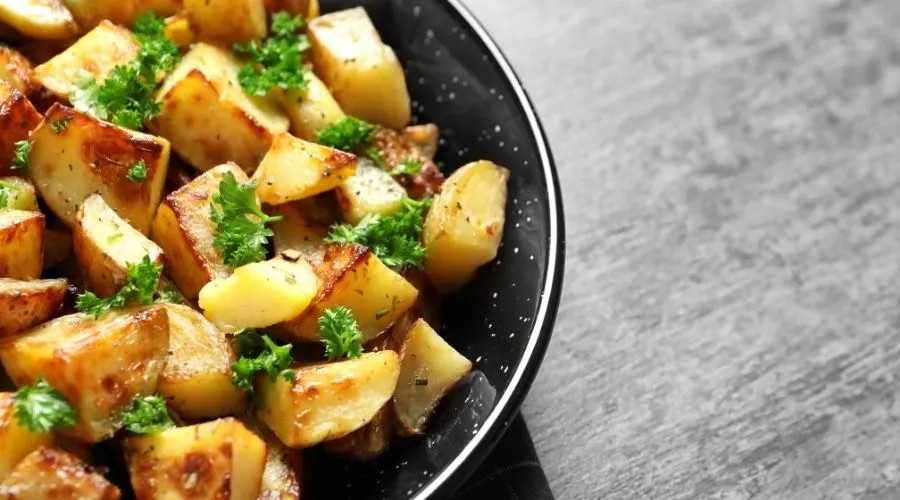If you’ve not tried canned potatoes before and you’re wondering what’s the difference between them and ordinary potatoes and are they worth trying, then look no further because in this article, I’ll be showing you the two differences between the two.
As well as comparing them nutritionally, I’ll also be comparing their uses, storage, and availability.
So, read on to find out much more about canned potatoes vs. fresh and tell us which you like best by voting in our poll.
Also in This Article
In a hurry, or looking for something specific? Use the links below to jump to the relevant section:
What are Canned Potatoes?
This might sound like a stupid question, but if you’ve never tried or used canned potatoes before, you might not know how they’re canned and what they’re for.
Canned potatoes are pre-cooked potatoes that are generally produced in three ways; whole baby (new potatoes), diced potatoes (cut into small cubes), or sliced small potatoes.
The potatoes are canned in water and usually salt (for flavor), and they can be drained and used in a variety of ways.
Canned potatoes are good if you don’t have time to peel, prep, and cook potatoes because they can be quickly heated or cooked in a variety of ways as an alternative to fresh potatoes.

Nutritional Comparison
Canned vegetables often lose some nutrients during the canning process, so I’ll now compare each kind of potato to find out if there’s any difference in this case.
To ensure the comparison is accurate, I’ll be comparing them weight for weight-for-weight per 100g of potatoes.
The data below is based on official USDA nutritional information between generic canned potatoes and boiled potatoes without skins (which is the closest comparison to the canned version).
Calorie Comparison
When vegetables are pre-cooked and canned, they’re often lower in calories than the fresh version because they have a higher water content and fewer carbohydrates.
Per 100g, canned potatoes contain 84.3g of water compared to fresh boiled potatoes, which contain 77.5g.
This difference in water content is reflected in the calorie values because canned potatoes contain 26 fewer calories per 100g than boiled potatoes.
| Potato Type | Calories Per 100g |
| Canned Potatoes | 60kcal |
| Fresh Potatoes (boiled) | 86kcal |
Nutritional Comparison
When comparing the main nutritional groups between canned potatoes and fresh you can see that canned potatoes contain fewer carbohydrates and sugars, but they are fairly similar in values for fiber and protein.
Canned potatoes are higher in sodium because they’re canned with added salt, but some low-sodium options are available in most large grocery stores.
| Nutrition Type | Canned Potatoes (Amount per 100g) | Fresh Potatoes (Amount per 100g) |
| Carbohydrates | 13.6g | 20g |
| of Which are Sugars | 0.6g | 0.89g |
| Dietary Fiber | 2.3g | 1.8g |
| Fat | 0.21g | 0.1g |
| of Which is Saturated Fat | – | – |
| Trans Fat | – | – |
| Cholesterol | – | – |
| Protein | 1.41g | 1.71g |
| Sodium/Salt | 219mg | 5mg |

The graph now shows that Canned Potatoes provide 13.6% and Fresh Potatoes provide 20.0% of the daily value for carbohydrates per 100g serving. The recommended daily intake of carbohydrates is 275 grams.
Vitamins & Minerals Comparison
The table below shows a side-by-side comparison of the micronutrients found in canned and fresh boiled potatoes.
As you can see, fresh potatoes contain higher levels of vitamins and minerals in most categories, although some are fairly similar, and many are found in low levels in potatoes without skins.
It is common for canned vegetables to be lower in most vitamins and minerals because of the process they go through so they can be stored for a long period of time.
| Vitamin/Mineral Type | Canned Potatoes (Amount per 100g) | Fresh Potatoes (Amount per 100g) |
| Calcium | 5mg | 8mg |
| Iron | 1.26mg | 0.31mg |
| Phosphorus | 28mg | 40mg |
| Potassium | 229mg | 328mg |
| Magnesium | 14mg | 20mg |
| Thiamin | 0.068mg | 0.098mg |
| Riboflavin | 0.013mg | 0.019mg |
| Vitamin B6 | 0.188mg | 0.269mg |
| Vitamin C | 5.1mg | 7.4mg |
| Niacin | 0.915mg | 1.31mg |
| Zinc | 0.28mg | 0.27mg |
*mcg = microgram (1000th of a milligram) / mg = milligram (1000th of a gram)
Uses Comparison
Potatoes are one of the most versatile vegetables we buy and use with hundreds of uses, from a side dish to the star of the show, but can canned potatoes be as versatile as fresh?
The answer is yes; you can do a lot of the things with canned potatoes that you can do with fresh, with the exception of baking or cases when you need the skin because canned potatoes come ready peeled.
Canned potatoes come pre-cooked, so they can only be used in instances where the recipe requires cooked potatoes and not raw. It’s also a good idea to check the can for other ingredients such as salt, which could alter the flavor of your recipe.
Below is a list of uses for canned potatoes:
- Make mash from canned whole potatoes with cream, butter, and seasoning to add some luxury and improve the texture.
- Pan-fry/saute diced potatoes in a little oil and butter to make them golden brown.
- Fluff up some whole baby canned potatoes and roast in a little oil and herbs.
- Use sliced canned potatoes as a topping for a cottage pie or casserole; then oven bake with a drizzle of oil to make them go golden and crispy.
- Use diced canned potatoes in soups, curries, and casseroles where you need potatoes, and you don’t have much prep time.
The beauty of canned potatoes is that you can do all of these things without having to peel and chop, so they’re great for a quick meal when you don’t have much time.

Storage and Availability
Fresh potatoes are available in pretty much any grocery store, large and small, and they’re used in most countries across the world, so potato availability is not an issue.
Canned potatoes are also found in most large grocery stores, and they’re a good panty addition that can be kept for up to around three years or until the manufacturer’s use-by date.
Fresh potatoes can also be stored for a relatively long time when compared to other vegetables, and providing they’re kept in a cool dark place, they can stay fresh for up to a month or even two in the right conditions.
Fresh potatoes can also be prepared, cooked, and frozen in various states for up to a year and until you’re ready to use them.
Flavor/Texture Comparision
Potatoes don’t have a strong flavor, so most recipes require added seasonings and flavors to make them more exciting.
There’s not that much difference between the flavor of canned and fresh potatoes, but the canned version has a slightly different texture due to the added water they’re stored in.
When it comes to choosing the best kind of potatoes for flavor and texture, this is subjective, so we need to do a poll to get a broader opinion.
Please help us by voting for your favorite – canned potatoes or fresh, and once you vote, the winner so far will be revealed (no personal information is required to vote).
Summary
Now that we’ve compared canned and fresh potatoes in all categories, I can now summarise the main differences between the two:
- Canned potatoes are lower in calories than fresh potatoes because they have fewer carbohydrates and contain more water.
- Fresh potatoes are higher in vitamins and minerals than the canned version.
- Canned potatoes can be stored for a long time, and they don’t require much preparation because they’re pre-cooked and peeled.
- Although fresh potatoes are more versatile and have more uses, canned potatoes are good for certain dishes when you don’t have much time.
It all comes down to which kind you like best and which is the most convenient for your lifestyle, but hopefully, the information in this article can help you decide.
More Canned Potato Vs. Fresh FAQ’s
Canned potatoes aren’t unhealthy, but they are lower in most vitamins and minerals than the fresh alternative, and they make a good swap if you don’t have time to prepare fresh potatoes.
People generally buy canned potatoes to keep in a store cupboard or pantry for those times when they don’t have fresh potatoes or they need a quick alternative. Canned potatoes are pre-cooked, peeled, and in some cases chopped or sliced so they don’t require much preparation.
Related Articles
I hope this article has helped you to find the information you were looking for; you might also find the following articles helpful too:
Canned Asparagus Vs. Fresh (Which is Best)
Canned Green Beans Vs. Fresh (Which Are Better?)
Fiber One Cereal vs Oatmeal (Which One is Better)
References Used for this Article
To ensure the nutritional information used in this article is accurate, I have used data from the USDA FoodData Central; the links below contain the source information:
